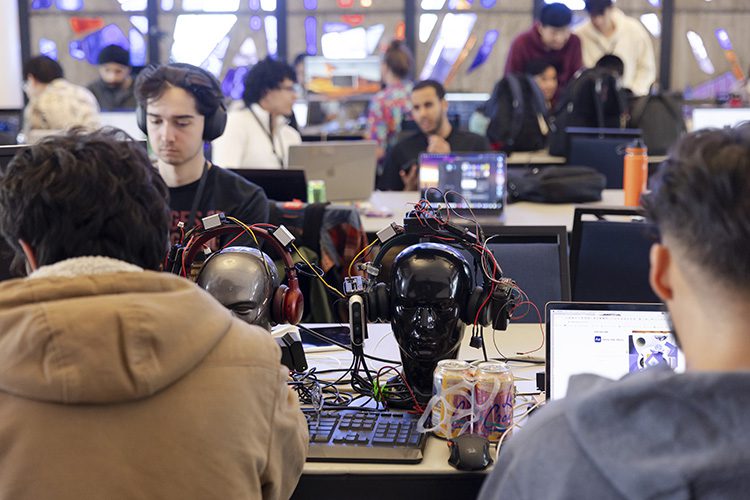TL;DR:
- UC Berkeley hosted a record-breaking 36-hour AI hackathon with over 1,200 participants from around the world.
- The event, organized by Berkeley SkyDeck and Cal Hacks, showcased the potential of learning language models (LLMs) and artificial intelligence (AI) applications.
- Hackers worked relentlessly, vying for the chance to win one of four $50,000 awards to fund their entrepreneurial endeavors.
- Engaging activities, panel discussions, and workshops enriched the hackathon experience, focusing on responsible and ethical AI use.
- Winning projects spanned various AI applications, from gaming to financial planning and health and wellness.
- UC Berkeley’s supportive environment and legacy of innovation make it an ideal hub for nurturing freethinkers and disruptors.
Main AI News:
The dynamic campus of UC Berkeley recently played host to a groundbreaking event that celebrated the spirit of innovation and intellectual freedom. Over 1,200 talented computer hackers from across the globe flocked to the iconic Martin Luther King Jr. Student Union for a remarkable 36-hour hackathon centered around artificial intelligence (AI) and learning language models (LLMs). This monumental gathering, hailed as the largest of its kind, was expertly organized by Berkeley SkyDeck, the esteemed startup accelerator, in collaboration with Cal Hacks, a respected nonprofit known for hosting collegiate hackathons.
Eager participants, including ambitious individuals from as far away as New Zealand and Singapore, converged on the campus with a shared goal: to breathe life into their AI-inspired projects by harnessing the power of LLMs, akin to the remarkable ChatGPT. The atmosphere was electric as sleeping bags were spread across the floors of the student union, with every inch of space at tables in high demand. The enthusiasm overflowed into neighboring venues like Zellerbach Hall and lower Sproul Plaza, where laptop-clad hackers were engrossed in their work. All eyes were set on the ultimate prize: one of the four coveted $50,000 awards.
In between coding marathons, participants found solace in lively activities designed to reinvigorate their minds. Foosball and skeeball brought a spirited break from the glowing screens, while outside the student union, llamas awaited, providing a touch of animal-assisted therapy to support the hackers’ mental well-being. Some attendees sought the challenge of solving Rubik’s Cubes, while others cozied up to the adorable life-sized teddy bears that adorned the event stage in the student union.
The hackathon wasn’t solely focused on intense coding sessions; it also presented a platform for knowledge sharing and exploration. Esteemed industry leaders such as Microsoft’s Annie Pearl and AI scientist Mark Nitzberg from the Berkeley Artificial Intelligence Research Lab spearheaded panel discussions and workshops. These engaging sessions delved into the intricacies of building responsible and ethical AI models, ensuring the technology’s positive impact on society.
For many hackers, the mere thought of taking breaks was unimaginable, leading to the staggering consumption of almost 2,000 cans of Red Bull energy drink throughout the hackathon. After an awe-inspiring 36-hour hacking marathon, the judging panel selected 12 exceptional teams as finalists out of an impressive total of 268 teams. These finalists were given the opportunity to present their innovative projects, and ultimately, four remarkable teams emerged as the winners of the highly sought-after $50,000 grants. These groundbreaking projects spanned a wide spectrum of AI applications, from enhancing non-player characters’ depth in gaming to revolutionizing financial planning and management and even enabling personalized health and wellness plans based on blood panel results.
Chon Tang, an advisor at Berkeley SkyDeck, lauded the event as the most significant AI LLM hackathon to date. He emphasized that it provided hackers with a comprehensive platform, offering all the necessary resources to embark on their AI journeys. “Learning language models possess the potential to revolutionize the way we create and collaborate, ushering in a new era of prosperity,” Tang declared. “The field of AI is still in its infancy, but UC Berkeley alumni and researchers have played pivotal roles in co-founding major companies in this space, including the trailblazing OpenAI and Anthropic. It’s only fitting that the Summer of AI finds its beginnings in the nurturing embrace of this renowned institution, which has long been recognized as a haven for freethinkers and disruptors.”
Conclusion:
The UC Berkeley AI hackathon signifies the growing prominence of AI and LLMs in the market. The event highlights the potential of these technologies to revolutionize industries, fostering a culture of innovation and collaboration. With UC Berkeley’s track record of producing successful AI companies, the hackathon serves as a platform for emerging talent, providing a glimpse into the future of AI-driven entrepreneurship. The remarkable projects and participation from diverse global talent demonstrate the increasing importance of responsible AI development and the significant market opportunities that lie ahead.

